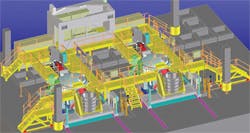Auto Chassis International — a Renault subsidiary and Tier One designer and manufacturer of suspension and chassis systems for vehicle manufacturers worldwide — recently started up an expansion of at its ferrous foundry at Le Mans, France, claiming it is the most advanced operation of its kind in the world.
The new line, capable of producing up to 55,000 metric tons/year of brake parts (discs, drums), camshafts, and other parts, melts iron at a rate of 30-metric tons/hour.
The new production line includes two 10-metric ton capacity furnaces capable of simultaneous controlled pouring to a Savelli green sand molding line. This process, supplied by Fomet Srl., is capable of pouring 250 molds per hour in each of two lines, or 500 molds per hour.
Fomet developed the furnaces for high-volume foundries producing gray iron or ductile iron castings, using carousel or Disamatic (vertical or horizontal) molding lines. These are channel induction furnaces with high heat-insulating capability. They are fitted with pressurized metering devices and a PLC-controlled stopper-rod action that makes automatic pouring possible.
The PLC controls maintain all variables of pouring to reproduce the ”flashfilling instructions” with a high degree of accuracy and repeatability, according to a model established by the operator using the system’s ”teach-in” functions. Each furnace is equipped with a highefficiency flanged and interchangeable inductor (a patented Fomet design), with an air-cooled coil. The builder also has developed customized refractory linings and an advanced process control systems, which it credits with achieving significant electrical energy savings and minimal thermal losses.
For the Le Mans installation, Fomet reports it equipped the two furnaces with ”the most technically advanced pouring control system yet seen in foundries, which includes metal level control by laser, and a reactive intelligent video camera system to supervise the control of the dosage of molten iron into the molding boxes.”
In addition, each furnace has ”smart” automatic inoculation capability for ”in stream” correcting metal composition. The vessels are outfitted with a dynamic electronic weighing capability that continuously collects and transmits data to process control computers that track furnace metal volume.
Also supplied for Le Mans was an automatic furnace charging system, with interchangeable, 3-metric ton ladles. Once each full ladle is placed in the charging unit, it is raised, tilted and controlled by the management system to provide a constant feed to the furnace inlet siphon, with no interruption to pouring.
Thanks to a management interface, process data from the pouring system is exchanged with other plant data, keeping process information continually updated for maximum efficiency and alerting operators to any potential problems that may demand intervention. ”The entire system is designed to function close to 96% efficiency,” according to Fomet. This is Fomet’s second pouring system installation for at Le Mans. The company is a designer and builder of induction melting furnaces for iron, copper and brass, as well as pouring furnaces and a range of other foundry process equipment.
